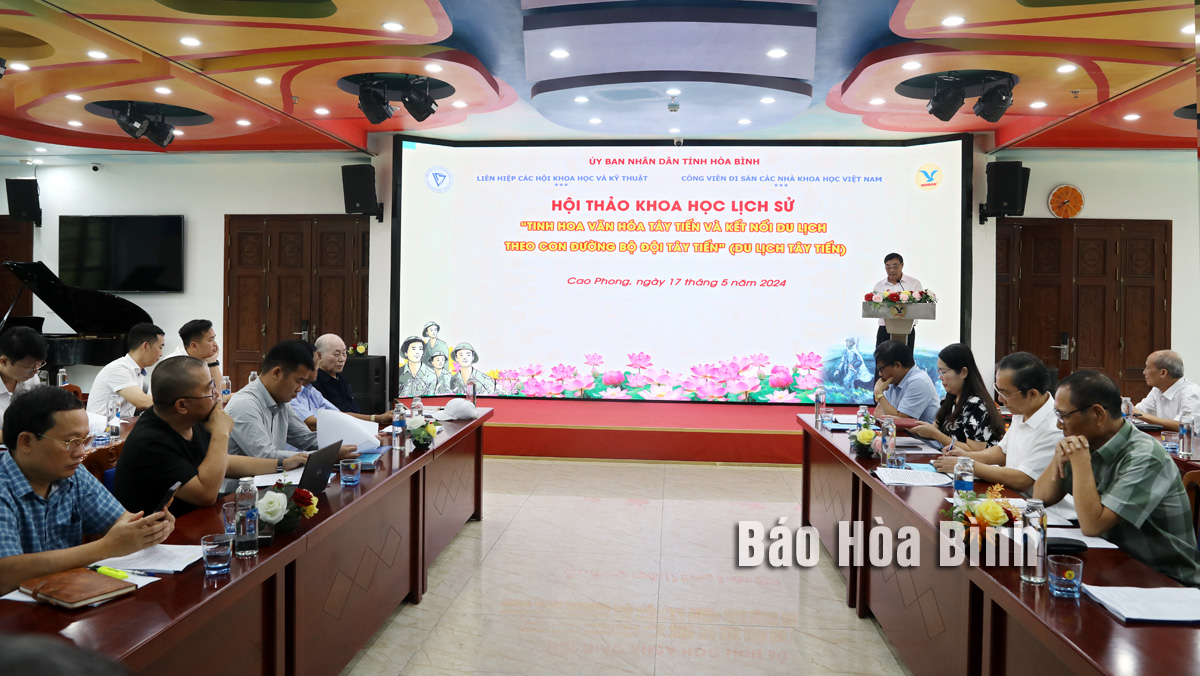
The provincial Union of Science and Technology in coordination with the Heritage Park for Scientists & Scholars of Vietnam has organised a symposium on culture traits associated with Tay Tien (Westward advancing) soldiers and tourism along the route they once marched.
A view of the symposium.
The May 17 event formed part of the
science-technology activities aiming to promote the cultural and historical
values of documents and objects related to the Tay Tien Regiment, thus
promoting local tourism.
Other activities include adding more than 50
documents and objects presented by the soldiers’ relatives to the provincial
museum, raising the total number of such items collected since 2012 to 350; and
clarifying many stories featuring sentiments between the soldiers and
residents, notably ethnic groups in Hoa Binh province.
The Tay Tien front covered Hanoi, Hoa Binh, Son
La, and Thanh Hoa of Vietnam, and Huaphanh of Laos.
Over the past time, Hoa Binh and other
localities have carried out an array of activities to commemorate Tay Tien
soldiers and raise youths’ awareness of their sacrifice.
There are three relic sites associated with the
regiment, of them two in Lac Son (Hoa Binh) and Muong Lat (Thanh Hoa) winning
the provincial status, and the other in Moc Chau (Son La) earning the national
recognition.
At the symposium, participants looked into the
cultural and historical values of the documents and objects, and raised
proposals to promote Tay Tien tourism in Hoa Binh, as well as tours along the
route, from Hanoi through Hoa Binh and Son La to Huaphanh.
With an increasingly vibrant and widespread emulation movement aimed at building cultured residential areas and cultured families, Yen Thuy District has been making steady progress toward improving both the material and spiritual well-being of its people, while fostering a civilized, prosperous, beautiful, and progressive community.
Once lacking recreational spaces and community facilities, Residential Group 2 in Quynh Lam Ward (Hoa Binh City) has recently received attention for the construction of a new, spacious, and fully equipped cultural house. The project followed the model of state support combined with public contributions in both labor and funding.
The "All people unite to build cultural life" movement, which has been effectively integrated with Kim Boi district’s socio-economic development goals, is fostering a lively spirit of emulation across local residential areas, hamlets, villages, public agencies, and enterprises. In addition, through the initiative, traditional cultural values are being preserved and promoted, while community solidarity and mutual support in poverty reduction and economic development are being strengthened.
A working delegation of the Hoa Binh provincial People’s Committee led by its Permanent Vice Chairman Nguyen Van Toan on June 11 inspected the progress of a project to build the Mo Muong Cultural Heritage Conservation Space linked to tourism services in Hop Phong commune, Cao Phong district.
Born and growing in the heroic land of Muong Dong, Dinh Thi Kieu Dung, a resident in Bo town of Kim Boi district, in her childhood was nurtured by the sweet lullabies of her grandmother and mother. These melodies deeply imprinted on her soul, becoming an inseparable part of her love for her ethnic group's culture. For over 20 years, this love for her hometown has driven Dung to research, collect, and pass down the cultural values of the Muong people to future generations.
In the final days of May, the Ethnic Art Troupe of Hoa Binh Province organized performances to serve the people in remote, mountainous, and particularly disadvantaged areas within the province. These were not just ordinary artistic shows, but they were the meaningful journeys aimed at spreading cultural values, enhancing the spiritual life of the people and contributing to the preservation of ethnic minority cultural identities.



